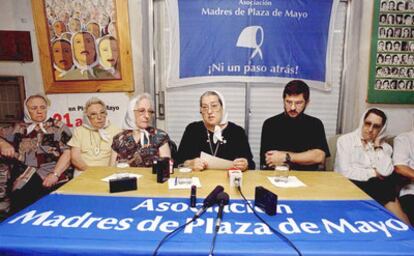Cash caper embroils Argentina's Mothers
Former aide to human rights group accused of embezzling donations
Argentina's human rights group Mothers of the Plaza de Mayo is embroiled in a growing scandal after a close aide to the organization's founder was accused of embezzling public and private donations to pay for upscale homes and luxurious cars for himself and his brother.
A host of lawsuits and complaints have been filed against Sergio Schoklender, the former right-hand man to the Mothers' president, Hebe de Bonafini. The controversy was ignited as the political motors begin revving before the upcoming presidential race and is taking a toll on the government of President Cristina Fernández de Kirchner, who has close ties with the Mothers.
This week, opposition politicians publicly questioned how much Fernández knew about the embezzling of money at the internationally renowned human rights organization, which grew out of a search for loved ones who went missing during Argentina's 1976-83 military dictatorship.
Schoklender, who is no longer associated with the Mothers of the Plaza de Mayo, made a surprise appearance on Monday before a federal judge in order to clear his name. For weeks, reports about Schoklender's lifestyle, including money-laundering allegations and photos of the homes he has purchased, have been daily offerings in the Argentinean press.
Although Schoklender has not been criminally charged, prosecutors have asked Federal Judge Norberto Oyarbide to prohibit him from leaving the country for the duration of the inquiry.
Schoklender and his younger brother Pablo were in charge of Shared Dreams, a program developed by the Mothers of Plaza de Mayo to build homes for the underprivileged using both government and private money. The Schoklenders were asked to leave the organization when auditors found missing funds and a large number of unpaid bills.
Sergio and Pablo Schoklender have a sordid past. They served time in prison for torturing and killing their parents in 1981. During their trial, the brothers made allegations of abuse by their mother and father.
De Bonafini, one of the Mothers' founders, met Sergio Schoklender in 1983 during her daily rounds in the prisons to visit political prisoners. After he was released from jail, Schoklender went to the Mothers and De Bonafini "accepted him like a son."
The often brash and outspoken De Bonafini had refused to comment on the scandal engulfing her organization, even last Thursday when the Mothers went on their weekly walk at the plaza from which they take their name. She blamed "that son-of-a-bitch" Mauricio Macri, the Buenos Aires mayor and one of Fernández's harshest critics, for starting the rumors. But on Monday her bluster faded and she told the Tiempo Argentina daily that she began to argue with Schoklender last year after he suggested that the Mothers get involved in home-construction schemes.
"I started to see things I didn't like," she said, adding that she never suspected anything illegal. "There was never any deception against [the government] nor did anyone ever tell me that there was money missing." De Bonafini said that she dismissed the brothers and 16 other people linked to the scandal. Schoklender has turned over documents and statements to Judge Oyarbide to justify his personal finances.
Meanwhile the government is dealing with the political fallout from the scandal by defending De Bonafini. "She is putting things back in order," the president's chief of staff, Aníbal Fernández, told Clarín newspaper. "If someone is responsible, then they must be punished."
Ex-President Eduardo Duhalde told a radio station Sunday that "there had always been whispers" about what was happening inside the organization. "What do the Mothers know about being housing developers?" asked Duhalde, who wants to run against Fernández in October. "They thought they could do anything with that money because it was theirs."

Tu suscripción se está usando en otro dispositivo
¿Quieres añadir otro usuario a tu suscripción?
Si continúas leyendo en este dispositivo, no se podrá leer en el otro.
FlechaTu suscripción se está usando en otro dispositivo y solo puedes acceder a EL PAÍS desde un dispositivo a la vez.
Si quieres compartir tu cuenta, cambia tu suscripción a la modalidad Premium, así podrás añadir otro usuario. Cada uno accederá con su propia cuenta de email, lo que os permitirá personalizar vuestra experiencia en EL PAÍS.
¿Tienes una suscripción de empresa? Accede aquí para contratar más cuentas.
En el caso de no saber quién está usando tu cuenta, te recomendamos cambiar tu contraseña aquí.
Si decides continuar compartiendo tu cuenta, este mensaje se mostrará en tu dispositivo y en el de la otra persona que está usando tu cuenta de forma indefinida, afectando a tu experiencia de lectura. Puedes consultar aquí los términos y condiciones de la suscripción digital.








































